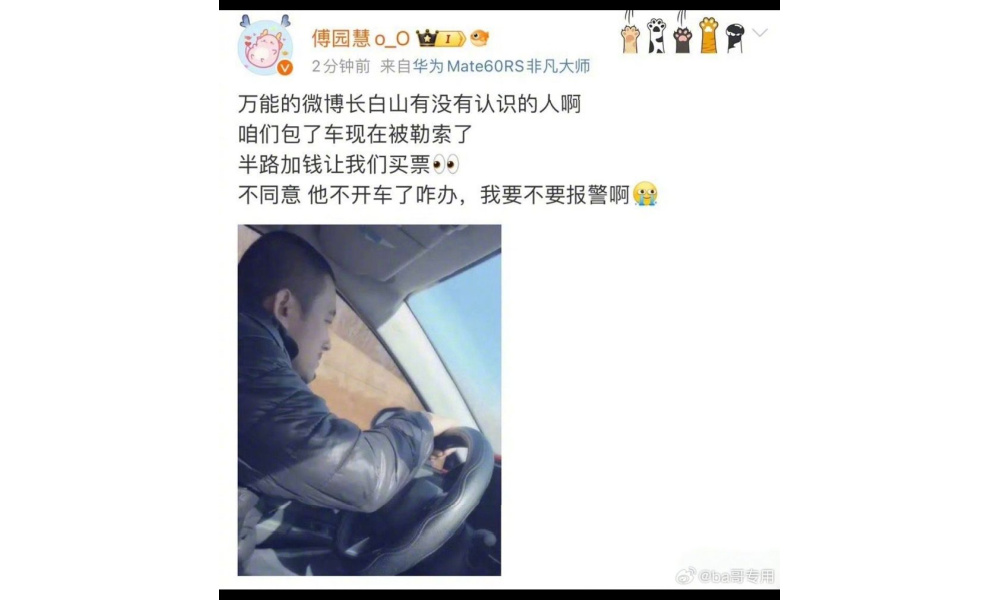“We hired a car and now we’re being extorted. Halfway through, they wanted us to pay more to buy tickets; we disagreed, so now the driver won’t continue driving. What should I do? Should I call the police?”
This was the plea for help that Olympic swimmer Fu Yuanhui (傅园慧) posted on Weibo on Saturday morning, February 17. The popular athlete informed her followers that she was around the Changbai Mountain Scenic Area, a popular winter tourist destination in China’s Jilin Province, when her driver suddenly demanded more money from her.

Shortly after posting about her predicament, Fu Yuanhui sent out an update: “Thank you all for following, the Jilin Ministry of Culture and Tourism swiftly stepped in, the problem is already solved now. Thanks everyone.”

Following these posts, Fu Yuanhui and the Changbai incident quickly went trending on Weibo, where many people commented that her situation was only resolved so quickly because she is famous.
Fu Yuanhui became a Chinese internet sensation eight years ago, after her performance and interviews during the Summer Olympics in Rio de Janeiro. When talking to reporters, Fu was excited, positive, and refreshingly honest. She introduced the popular phrase “mystical powers” (洪荒之力, literally: power strong enough to change the universe) when explaining that she was swimming extra fast because she was “using all ‘mystical powers'” (read more). She also went viral for expressing genuine delight upon discovering she had won a bronze medal, and for disclosing that she did not swim very well another time because she was on her period.

Fu Yuanhui charmed Chinese audiences after her disarming interviews during the Summer Olympics in 2016.
Following her Olympic success, Fu gained many fans on social media. On Weibo, she has over 7 million followers.
It is clear that her fame and relatively large following played a role in how fast her issue was resolved. Not only did the local authorities step in, the driver who extorted her reportedly was also quickly punished for his actions and received a 30,000 yuan fine (US$4215). A related hashtag, published by state media outlet CCTV, went viral and received over 130 million views on Weibo (#对傅园慧加价黑车司机被罚3万元#).
While most are glad to see the driver get punished so soon, many commenters argue that it’s unfair for someone like Fu Yuanhui to receive swift assistance while many ordinary travelers across China facing scams during this holiday season struggle to get the help they need.
On February 16, a Chinese family of five was kicked off a tour bus during their trip in Lijiang, Yunnan, because they had refused to purchase a bracelet worth 50,000 yuan ($7,025) as instructed by their tour guide during a visit to a jade shop. This incident also went viral on Weibo (#一家人旅游未买5万手镯被赶下车#, 130 million views), sparking outrage over local travel scams and the perceived inaction of tourism authorities.
A significant factor in these discussions is how Chinese local tourism authorities have been ramping up their marketing efforts following the pandemic and China’s zero-Covid policy. Seeking to attract more domestic tourists, they’ve been exploring new strategies to promote their hometowns, particularly among younger generations. Since early 2023, various tourism bureau chiefs from across China have gone viral on platforms like Weibo, Douyin, and beyond for their innovative social media campaigns.
The marketing success of certain destinations, such as ‘BBQ town’ Zibo, has also inspired other cities or regions throughout China to go all out in presenting their best side. Some of them, such as Harbin, have succeeded in becoming yet another holiday hit.
While these kind of campaigns are generally applauded, many believe that actions speak louder than words. They argue that besides focusing on social media campaigns, local tourism authorities should do more to protect common travelers against scams, rip-offs, and fraud.
“What will you do next time this happens?” many ask, and: “what should normal people without a big social media following do when this happens to them?”
“Fu Yuanhui is a public figure, which is why this case was resolved. For regular people, nothing would happen – we don’t get heard,” another person wrote.
While many criticize Jilin authorities for aiding Fu Yuanhui without effectively addressing tourist scams, most people don’t blame Fu Yuanhui at all for seeking the help she needed. “After all,” one commenter wrote, “She does have mystical powers.”
By Manya Koetse
With contributions by Ruixin Zhang
Get the story behind the hashtag. Subscribe to What’s on Weibo here to receive our newsletter and get access to our latest articles:
Spotted a mistake or want to add something? Please let us know in comments below or email us. First-time commenters, please be patient – we will have to manually approve your comment before it appears.
©2024 Whatsonweibo. All rights reserved. Do not reproduce our content without permission – you can contact us at info@whatsonweibo.com.
The post Olympic Swimming Fu Yuanhui Gets Help via Weibo Following Taxi Scam appeared first on What's on Weibo.



















